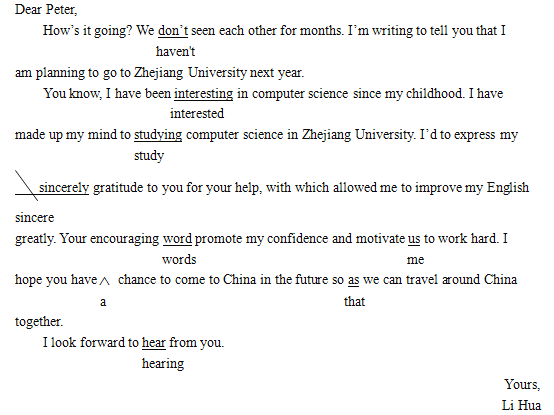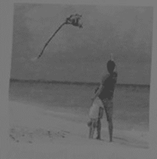ƒøƒ⁄»ð
°æƒø°øºŸ∂®”¢”ÔøŒ…œ¿œ ¶“™«ÛÕ¨◊¿÷ƺ‰Ωªªª–Þ∏ƒ◊˜Œƒ£¨«Îƒ„–Þ∏ƒƒ„Õ¨◊¿–¥µƒ“‘œ¬◊˜Œƒ°£
Œƒ÷–π≤”–10¥¶”Ô—‘¥ÌŒÛ£¨√øæ‰÷–◊Ó∂ý”–¡Ω¥¶°£√ø¥¶¥ÌŒÛΩˆ…ʺ∞“ª∏ˆµ•¥ µƒ‘ˆº”°¢…æ≥˝ªÚ–Þ∏ƒ°£
‘ˆº”£∫‘⁄»±¥ ¥¶º”“ª∏ˆ¬©◊÷∑˚∫≈£®![]() £©£¨≤¢‘⁄∆‰œ¬√Ê–¥≥ˆ∏√º”µƒ¥ °£
£©£¨≤¢‘⁄∆‰œ¬√Ê–¥≥ˆ∏√º”µƒ¥ °£
…æ≥˝£∫∞—∂ý”ýµƒ¥ ”√–±œþ£®![]() £©ªÆµÙ°£
£©ªÆµÙ°£
–Þ∏ƒ£∫‘⁄¥Ìµƒ¥ œ¬ªÆ“ª∫·œþ£¨≤¢‘⁄∏√¥ œ¬√Ê–¥≥ˆ–Þ∏ƒ∫Ûµƒ¥ °£
◊¢“‚£∫1.√ø¥¶¥ÌŒÛº∞∆‰–Þ∏ƒæ˘ΩˆœÞ“ª¥ £ª
2.÷ª‘ –Ì–Þ∏ƒ10¥¶£¨∂ý’þ£®¥”µ⁄11¥¶∆£©≤ªº∆∑÷°£
Dear Peter,
How°Øs it going? We don°Øt seen each other for months. I°Øm writing to tell you that I am planning to go to Zhejiang University next year.
You know, I have been interesting in computer science since my childhood. I have made up my mind to studying computer science in Zhejiang University. I°Ød to express my sincerely gratitude to you for your help, with which allowed me to improve my English greatly. Your encouraging word promote my confidence and motivate us to work hard. I hope you have chance to come to China in the future so as we can travel around China together.
I look forward to hear from you.
Yours,
Li Hua
°æ¥∞∏°ø
°æΩ‚Œˆ°ø
1.øº≤È ±Ã¨°£æ‰“‚£∫Œ“√«∫√æ√√ªº˚√Ê¡À°£∏˘æðfor monthsø…÷™æ‰◊””√œ÷‘⁄ÕÍ≥… ±Ã¨£¨π ∞—µ⁄∂˛æ‰ don't∏ƒ≥…haven't°£
2.øº≤ÈπÃ∂®¥ ◊È°£be interested in∂‘---∏––À»§£¨π ∞—µ⁄Àƒæ‰ interesting∏ƒ≥…interested°£
3.πÃ∂®¥Ó≈‰°£make up one°Øs mind to do sth.œ¬æˆ–ƒ»•◊ˆƒ≥ ¬°£π ∞—µ⁄ŒÂæ‰ studying∏ƒ≥…study°£
4.øº≤È–Œ»ð¥ °£¥À¥¶gratitude «√˚¥ £¨”√–Œ»ð¥ –Þ Œ£¨π ∞—µ⁄¡˘æ‰ sincerely∏ƒ≥…sincere°£
5.øº≤È∂®”Ô¥”扰£¥À¥¶your help «œ»––¥ £¨÷∏ŒÔ£¨‘⁄∫Û√ʵƒ∑«œÞ÷∆–‘∂®”Ô¥”æ‰÷–◊ˆ÷˜”Ô£¨π …æ≥˝with°£
6.øº≤È√˚¥ ∏¥ ˝°£æ‰“‚£∫ƒ„πƒŒË»À–ƒµƒª∞”Ôº§∑¢¡ÀŒ“µƒ–≈–ƒ£¨º§¿¯Œ“≈¨¡¶π§◊˜°£Ω·∫œæ‰“‚ø…÷™¥À¥¶”√√˚¥ ∏¥ ˝£¨π ∞—µ⁄∆þæ‰ word∏ƒ≥…words°£
7.øº≤È¥˙¥ °£æ‰“‚£∫ƒ„πƒŒË»À–ƒµƒª∞”Ôº§∑¢¡ÀŒ“µƒ–≈–ƒ£¨º§¿¯Œ“≈¨¡¶π§◊˜°£Ω·∫œæ‰“‚ø…÷™¥À¥¶∞—us∏ƒ≥…me°£
8.øº≤Èπ⁄¥ °£æ‰“‚£∫Œ“œ£Õ˚ƒ„Ω´¿¥”–ª˙ª·¿¥÷–π˙£¨’‚—˘Œ“√«æÕø…“‘“ª∆ª∑”Œ÷–π˙¡À°£have a chance to do sth.◊ˆƒ≥ ¬µƒ“ª∏ˆª˙ª·£¨π µ⁄∞Àæ‰ have∫Û√ʺ”…œa°£
9.øº≤ȃøµƒ◊¥”Ô¥”扰£æ‰“‚£∫Œ“œ£Õ˚ƒ„Ω´¿¥”–ª˙ª·¿¥÷–π˙£¨’‚—˘Œ“√«æÕø…“‘“ª∆ª∑”Œ÷–π˙¡À°£Ω·∫œæ‰“‚ø…÷™¥À¥¶ «so that“˝µºµƒƒøµƒ◊¥”Ô¥”扣¨π ∞—as∏ƒ≥…that°£
10.øº≤ÈπÃ∂®¥Ó≈‰°£look forward to doing sth.∆⁄≈Œ◊ˆƒ≥ ¬£¨π µ⁄æ≈æ‰ hear∏ƒ≥…hearing°£

 ‘ƒ∂¡øÏ≥µœµ¡–¥∞∏
‘ƒ∂¡øÏ≥µœµ¡–¥∞∏

